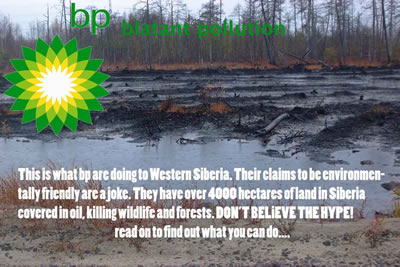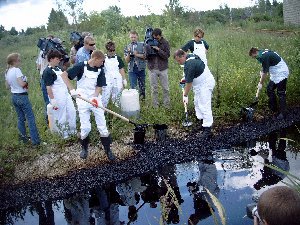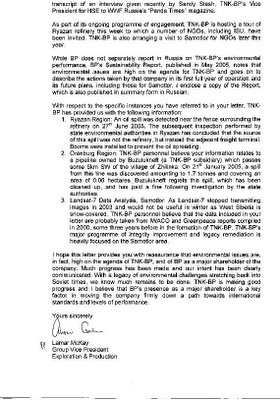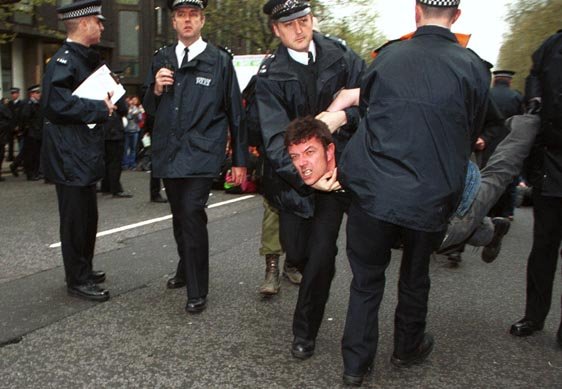Russian Oil: Propaganda and Protest
Siberian Shadowlands – Part 3
Part III: Russian Oil: Propaganda and Protest
Index Research

Levitan,1 The Vladimirka Road 1892
Levitan was a friend of Chekov. Prisoners walked and died on this legendary road to Siberia.
“The struggle between people and corporations will be the defining battle of the 21st century. If the corporations win … democracy will come to an end. The great social democratic institutions which have defended the weak against the strong – equality before the law, representative government, democratic accountability and the sovereignty of parliament – will be toppled. If, on the other hand, the corporate attempt on public life is beaten back, then democracy may re-emerge the stronger for its conquest. But this victory cannot be brokered by our representatives. Democracy will survive only if the people in whose name they govern rescue the state from its captivity.” George Monbiot2
INDEX
1. Environmental History of BP
2. Environmental History of Tyumen Oil Company (TNK)
3. War for Oil
4. TNK-BP Environmental Policy
5. Russian Environmental Protest
6. George Galloway vs TNK-BP London
7. Guy Taylor Goes to Russia
8. The Anticorporate Association in London
9. What Hope for the Future?
10. Appendix I. BP Goal 2001
11. Appendix II. Russian oil demonstration photos
12. Appendix III. Shingarkin: Enquiry Of A Citizen (3 letters)
13. Appendix IV. Oleniev Letter To G. Galloway, MP
14. Appendix V. George Galloway Letter To Lord John Browne
15. Appendix VI. BP Letter To George Galloway
16. Appendix VII. Guy Taylor Interview
1. Environmental History of BP
BP-Amoco3 was among the top 10 polluters in the U.S. Between 1989 and 1997 they ranked between the 5th and 9th largest toxic emitters under the U.S. Environmental Protection Agency’s (EPA) Toxic Release Inventory.
In 1995, Lord Browne4 – whose lifetime work had been with British Petroleum (BP) – had meanwhile become their Chief Executive Officer (CEO), aged 47.
In 1999, BP-Amoco won the special Greenhouse Greenwash Award. The publicity surrounding oil companies was not good. “When toxic chemicals are spilled, forests destroyed, employees left in poverty, or communities devastated through plant shutdowns, corporations view these as unimportant side effects outside their area of concern. But when the company ‘s stock price dips, that’s a disaster.” wrote Robert Hinckley.
In December of 1999, feeling the heat, Lord Brown responded,
“The old order, symbolized by the remote and arrogant corporation, convinced of its own virtue and invincibility, is passing. The new order is neither comfortable nor predictable; but it reminds us that companies, however big, are simply servants of society. We exist only because someone wants to buy what we provide. In a complex world, the companies that thrive will be those that can combine the traditional strengths, like a strong financial balance sheet and a great portfolio of assets, with something new: the capacity to listen and to learn.”5
The environmentalists were not pacified. In 2000, 100 BP-Amoco shareholders signed a petition against the BP-Amoco’s controversial plan for oil exploration in Alaska.
Between 2000 – 2002, Sharon Beder wrote, “BP planned to spend $200m rebranding its facilities, changing its signs and stationery and another $400m on advertising its gasoline and pushing the new logo…
In the end, despite BP’s rhetoric about social responsibility, triple bottom lines and enlightened self-interest, profits seem to count most. An oil company might invest in solar energy and admit that global warming should be prevented, but it will do all it can to ensure it can go on drilling for fossil fuels and expanding its markets for them.” More
2. Environmental History of Tyumen Oil Company (TNK) 6
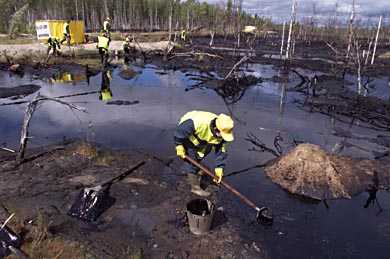 Greenpeace cleaning up an oil spill in Nizhnevartovsk,
Greenpeace cleaning up an oil spill in Nizhnevartovsk,
August 2000. Photo: Greenpeace Netherlands
The Siberian Samotlor oil field7 in Russia was declared an ecological disaster in June 2000.8 Samotlor was owned by Tyumen Oil Company (TNK), and BP-Amoco.9
In 2002, talks were underway between BP and TNK.
Meanwhile, on 19 November 2002, the tanker, Prestige, on its way to Singapore, sank off Spain’s north-western coast with a 70,000 – ton cargo of oil. The Prestige family tree was intentionally confusing. Prestige was owned by a Liberian company, Mare International, which itself was reputedly owned by a Greek. The ship was registered with Bahamas Maritime Authority, with offices in London. It carried oil for Crown Resources, a company formed in Gibraltar, based in London with (mostly) British directors, which moved to Switzerland. Crown Resources was, in turn, owned by the Russian Alpha Group Consortium. Alpha Group was founded and controlled by a member of the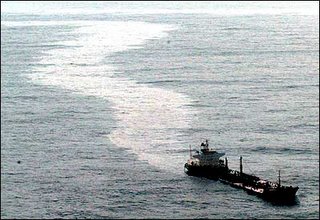 ‘new oligarchy,’ Mikhail Freedman10, (also Fridman; Friedman) then owner of Tyumen Oil Company (TNK). It was never made clear if the oil on Prestige was from the Russian oil fields.
‘new oligarchy,’ Mikhail Freedman10, (also Fridman; Friedman) then owner of Tyumen Oil Company (TNK). It was never made clear if the oil on Prestige was from the Russian oil fields.
The Prestige Carmelo Alen/AP
TNK had a history of corruption and other dubious practices. Further, a TNK contract with Halliburton11 was being questioned. In May 2003, Friends of the Earth said the compensation payments offered for the Prestige oil spill were a “grim joke.”
And in November of 2003, FOE reported that victims might never receive full compensation for their losses. Control and regulation appeared to be lacking whilst communities paid the price. FOE drew up a document making pertinent suggestions (PDF document).
TNK had decided, before its 50-50 ownership with BP, to spend $900m on programmes to protect the environment. This amount doubled with BP’s cooperation.
3. War for Oil
On February 15th 2003, the world exploded with the largest demonstrations ever known in history. ‘Black Propaganda’ had failed. The connection between government policy and oil was understood, and rejected. (See more information about these connections in Siberian Shadowlands, Part II, 3.)
By 2003, the vast oil fields (+ pollution) in Siberia were owned by TNK-BP.12 The key power people in this corporation are Lord John Browne13 and Mikhael Freedman.14 This company employs almost 100,000 people. Halliburton15 was hired to help revitalise these fields. Halliburton reported that Samotlor16 oil production had increased, as a result of their techniques, from 30 tons of oil per day per well in 2000, to 117 tons per day per well in 2004.
The first discussion on the TNK-BP website is ‘Our Company,’ with descriptions of its history, strategic overview, code of business conduct, corporate governance and contact information. This description takes precedence over people and the environment, which are then discussed in a lower hierarchical place. Environment and Safety effuses:
“Since Day 1, the Company leadership has worked to fulfill its commitment … to the following goals: no accidents, no harm to people, no damage to the environment. …” The company spends, it says, “approximately $180 million annually on mitigating operational injuries, damage to property and reducing the negative impact of our operations on the environment as well as upgrading our existing infrastructure.” Pipeline leaks are, the company says, the main “environmental problem.”
A July 2005 TNK-BP press release announced: “Preventing a Problem is Always Less Expensive Than Mitigating its Consequences.” More
The company stated: “We inherited approximately 5000 hectares of polluted soil and hundreds of pits. We have already reclaimed about 400 hectares of polluted soil last year and are going to increase the area of annually reclaimed soil each year… which increases the cost of oil production.”
And deforestation? The Russian fire safety requirements say: “deforestation is necessary for the construction of a drilling site, whereas the present-day international practice strives to minimize environmental changes and preserve forests.”
TNK-BP then consider ‘corporate social responsibility’.
“The Company’s voluntary commitment to a high level of social responsibility is the foundation of TNK-BP’s social policy.”
If one accepts this moral upside-down brief, it all sounds very reasonable. However, this hides the corporate convolutions of TNK-BP board squabbles, power struggles, share-holder complaints, political muscle-flexing, profit-pocketing, ethically questionable tax haven deals and transfer-pricing, and the highjacking of and irresponsibility towards serious environmental issues. More
5. Russian Environmental Protest
In March 2005, Project Citizen, The Institute for Globalization Studies (IPROG), and the International Social and Environmental Union, combined to form the Anticorporate Association. The purpose of the new Anticorporate Association was to find “persistent and habitual corporate lawbreakers … and to compel them to be more responsible.”
 Boris Kagarlitsky is the Director of IPROG. He is a writer17 and lecturer, and a member of the Transnational Institute
Boris Kagarlitsky is the Director of IPROG. He is a writer17 and lecturer, and a member of the Transnational Institute
He is 47, married with two children and has been active politically for many years. He became involved with environmental issues in 1988. In April 2005, Boris announced the first meeting of The Russian Social Forum. A larger opposition was taking shape in Russia, with honourable precedents dating back to 1994 with the protest of the Zapatistas18 in the rainforests of Mexico. Resistance to corporate interests and plundered resources have now become the bedrock of Latin American politics. More
The Russian Social Forum brought students, trade unions, environmental and human rights groups together. One thousand people attended this meeting in Moscow, followed by a demonstration on Pushkin Sq. Their purpose was to discuss tactics directed at present day Russian policies. More
The group decided their first focus would be on TNK-BP. TNK, a member of the group says, was “one of the most criminal and notorious oil corporations.” This person said that the company “was always involved in scandals. These were exposed in the press and on television. These scandals were caused by the criminal past of its owners,” former window cleaner A. Freedman and Chelsea’s football club owner, R. Abramovich.19
People didn’t protest about TNK because they were “either bribed, blackmailed or simply scared of possible violence on the part of TNK.”
 The Anticorporate Association have demonstrated in five separate regions: Orenburg; Ryazan 26-7 June; Tyumen, 27 July; Voronezh, S. Russia, about 400 kms from the Black Sea, in mid July, and in Moscow 14 September and 14 & 19 November.20 Group organizational problems and Russian corruption made matters difficult. And campaigning in Russia is hard because the laws are pro-corporate.
The Anticorporate Association have demonstrated in five separate regions: Orenburg; Ryazan 26-7 June; Tyumen, 27 July; Voronezh, S. Russia, about 400 kms from the Black Sea, in mid July, and in Moscow 14 September and 14 & 19 November.20 Group organizational problems and Russian corruption made matters difficult. And campaigning in Russia is hard because the laws are pro-corporate.
Simon Zhavoronkov 13.10.05
Photo S. Meyer
After they started their campaign, Simon Zhavoronkov, the 23 yr. old IPROG coordinator, was threatened nine times; one member, Mikhail Sevostianov, was beaten.
Three places were investigated in greater depth: Orenburg, Ryazan and the Siberian Samotlor oil fields.
Orenburg is in S. Russia, on the border with Kazakhstan. 200 meters away from the village of Zhivinka, a pipeline had burst the previous year. “It was like an volcanic eruption from the pipeline. There was huge environmental and social damage. The company cleared up the territory in 2004 and paid a fine of £40. None of the villagers have been reimbursed for the damage caused.” A small group picketed in the centre of Orenburg.
 In Ryazan, a regional capital with 1.5m people, there had been a large oil spill. In addition, some of the oil from this factory had fallen into the river and has now permeated the subsoil.
In Ryazan, a regional capital with 1.5m people, there had been a large oil spill. In addition, some of the oil from this factory had fallen into the river and has now permeated the subsoil.
Ryazan 27 June 2005
The group observed rivers and lakes polluted with oil. One oil leak was found in a stream next to the TNK-BP Ryazan oil refinery. The mineral oil, which came from an illegal drainage platform, mixed with water on open ground. The oil permeated the ground, affecting the local residents’ drinking water and also residents along the Listvyanka and finally the Oka River that flows to Moscow.
with water on open ground. The oil permeated the ground, affecting the local residents’ drinking water and also residents along the Listvyanka and finally the Oka River that flows to Moscow.
Ryazan 26 June 2005
A spat had developed between TNK-BP and SFAT-Ryazan. No one wanted to accept responsibility for the oil leak. BP denied that any oil was coming from its pipelines at Ryazan. “This oil has nothing to do with us. It’s coming from outside our yard.” Journalists and environmentalists landed in Ryazan to investigate the matter. TNK-BP guards detained them. The oil continued to leak. Maxim Shingarkin, director of the Citizen Foundation, told BBC Russia that “TNK-BP was paying little attention to the oil leak in Ryazan because it was one millionth of what is spilled at the company’s West Siberian oil fields.”21
On 30 June 2005 The Association lodged complaints to different authorities,22 who then said the letters had been lost. They were told to not intervene. “If, in Russia, a corporation does not like a law, it ignores that law,” a member of the group wryly observed. One reply was received.
A five point programme was sent to TNK-BP, asking them “investigate environmental and social crimes” and to “re-cultivate polluted areas. “ They also asked TNK-BP to create a Russian-British environmental observation group to monitor changes. BP did not respond to this letter.
On October 3rd, cases were submitted to the Ryazan regional court, and, as of 23 November, were still being checked.
No individual or above mentioned NGO group has ever had an invitation to any TNK-BP meeting, or had a written or verbal response from TNK-BP in either Russia or the United Kingdom.
On the 26th of July, Mr. V Oleniev, a member of the Ryazan Regional Duma, wrote a letter23 to  George Galloway,24 UK Respect Member of Parliament. He had received letters, he said, from concerned citizens about oil pollution, which was illegal on health and environmental grounds. He asked Galloway to address BP in London about the urgent measures needed for elimination of environmental pollution in Ryazan.
George Galloway,24 UK Respect Member of Parliament. He had received letters, he said, from concerned citizens about oil pollution, which was illegal on health and environmental grounds. He asked Galloway to address BP in London about the urgent measures needed for elimination of environmental pollution in Ryazan.
George Galloway
Galloway wrote25 to Lord John Browne,26 Chief Executive of BP on the 28th of July about the “large-scale infringements of environmental protection legislation of the Russian Federation caused by the economic activities of BP.” He listed the damage in the Ryazan and Oranberg regions and the 3780 sq miles of oil coverage27 in Samotlor.28 10% of the Samotlor devastation had happened, he noted, within the preceding 2 – 3 years.
economic activities of BP.” He listed the damage in the Ryazan and Oranberg regions and the 3780 sq miles of oil coverage27 in Samotlor.28 10% of the Samotlor devastation had happened, he noted, within the preceding 2 – 3 years.
Greenpeace satellite photo 2003 showing extent of damage
He asked Browne to “investigate with the utmost urgency these alleged infringements by BP in the specified regions and to arrange the elimination of this pollution.” He also asked for a public report “on how much you have spent from January to August 2005 inclusive on ecology, recultivation and rehabilitation and social responsibility in Russia.” He asked BP to inform the UK general public and the Russian Federation “on the measures undertaken by the company on restoration of the polluted regions.” He concluded: “I believe that prompt action will provide BP with a chance to show that the principles you espouse of openness, honesty and social responsibility are more than mere words.”
Lord John Browne did not reply. But on 11 August Lamar McKay, (‘bp’ Group Vice President, Russia and Kazakstan) did reply “on his behalf” from his 1 St. James Sq., London office.29 “None of these organizations has made any enquiry to BP’s Moscow office on the matters covered in your letter,” he wrote. He speaks of money spent on “legacy remediation and safety improvements” as well as “pipeline replacement and anti-corrosion work “ which are intended to improve and address the environmental performance of TNK-BP. He writes of contacts with NGOs. BP had not, he wrote, made a separate report on TNK-BP’s “environmental performance” and refers to the May ’05 report which “notes that environmental issues are high on TNK-BP’s agenda.” Actions taken by TNK-BP are described in this report, he wrote. He
- 1. denied TNK-BP was responsible for the Ryazan oil spill.
2. said the TNK-BP subsidiary company oil spill at Orenberg had been cleaned up and the company had paid the fine.
3. said the aerial photograph was taken in 2000, before the formation of TNK-BP.
Simon Zhavoronkov visited London from 13 – 15 September. He approached the Respect Party in the hopes of getting Respect involved in their Russian campaign against TNK-BP. John Rees, the national secretary of Respect, then introduced Simon to Guy Taylor30 from the Globalise Resistance office. Guy spoke with Simon on behalf of Respect concerning the campaign and potential actions in the UK. “I met with Simon a couple of times before going to Russia,” Guy said. “Simon wanted (and still does!) George Galloway to make the journey. The campaigners in Russia believe an MP going to Moscow, and perhaps Siberia, will add more weight and power to their campaign.” First, however, Guy was invited to Russia in order to form a stronger relationship between all the activists and Respect.
On 30 September, Guy travelled, on behalf of Respect31, to Nizhnevartovsk in Western Siberia with Simon Zhavoronkov and Maxim Shingarkin to inspect oil spills and leaks in the TNK-BP run Samotlor Oil Fields. In Guy’s report to Respect he wrote, “The best way of getting an overall view of the damage done to the area is from the sky, so we rented a helicopter and flew over the area for more than an hour. We were accompanied by a security official from either TNK-BP itself or the FSB (domestic branch of the reformed KGB).” He was prohibited from filming or taking photographs.
 Samotlor oil fields
Samotlor oil fields
Photo Guy Taylor 10/05
“What we saw was devastation – oil deposits up to a couple of hundred metres wide, some as much as a kilometre long.
 Samotlor oil Fields pollution
Samotlor oil Fields pollution
Photo Guy Taylor 10.05
These were particularly prevalent alongside roads and near to small extraction yards which had anywhere from 2 to 15 working pumps, connected to larger storage facilities by a network of pipelines, where there were more incidences of leaks onto the ground.
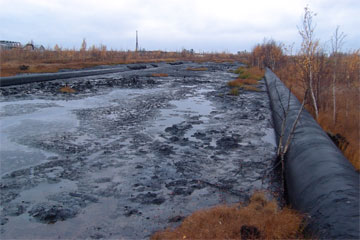
Samotlor pollution Photo Guy Taylor 10.05
Most yards had at least a small spillage beside them and some had much larger deposits.
 Samotlor pollution Photo Guy Taylor 10.05
Samotlor pollution Photo Guy Taylor 10.05
Further afield, the onset of autumn being very mild this year, the forest was green and plush.
After the helicopter journey we then went by car to the edge of the security-protected oil field, travelling into the area on foot, through woods and over marshes. On this expedition we photographed many comparatively small deposits of oil, sitting in ditches and on the ground, making areas of lifeless swamps surrounded by a border of a few metres which were entirely devoid of any sign of life.
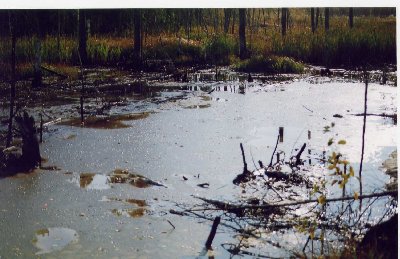 Samotlor pollution Photo Guy Taylor 10.05
Samotlor pollution Photo Guy Taylor 10.05
Nearby there was much evidence of the presence of TNK-BP, the distinctive blue and white trucks and huts. There was also a regular occurrence of many silver birch trees chopped down to provide a rough and ready track over swamps and oil spills.
 “Road” in Samotlor photo G Taylor
“Road” in Samotlor photo G Taylor
Some areas were flattened by the pollution. Others, presumably more recent, were marked by skeletal trees, many at unnatural angles, about to fall.
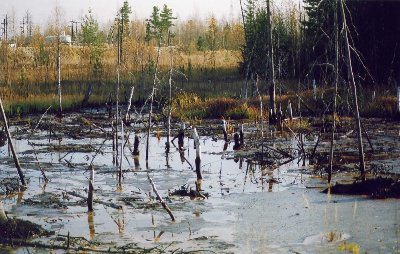 Samotlor pollution Photo Guy Taylor 10.05
Samotlor pollution Photo Guy Taylor 10.05
Where oil is no longer on the ground, having seeped into the ground, black scars which appeared like the damage from a fire remained. On closer inspection, it was the remains of a spill rather than a fire, with drying oil encrusted onto every surface.
 Samotlor pollution Photo Guy Taylor 10.05
Samotlor pollution Photo Guy Taylor 10.05
The next day we managed to drive into the heart of the oil field, having walked through woods again to avoid security. Here we saw much more drastic pollution. Huge swamps, ones we had seen from the air the previous day, lay on the ground. There was one area that had been cleaned up and re-cultivated, as TNK-BP had been ordered to do by environmental agencies, but it was a tiny area compared to the untreated swathes of oil swamps there. This time we managed to record film footage of the spills, and short statements from ourselves to camera stating where we were and why we were there.”
A press conference was held in Moscow on October 2nd. About 20 journalists, and a TNK-BP representative attended. “It was a big success. We managed to get considerable coverage in the Russian press,” Guy said.
8. The Anticorporate Association in London
 The Anticorporate Association decided to visit London to find solidarity with others. They wanted UK Parliamentary questions asked, pressure put on BP and street protests in London. This was a good idea, Guy thought. “The penalties for protesting in Russia are enough to scare the best of us, and illegal intimidation by corporate interests is formidable.”
The Anticorporate Association decided to visit London to find solidarity with others. They wanted UK Parliamentary questions asked, pressure put on BP and street protests in London. This was a good idea, Guy thought. “The penalties for protesting in Russia are enough to scare the best of us, and illegal intimidation by corporate interests is formidable.”
Boris Kagarlitsky, George Galloway,
Simon Zhavoronkov Guy Taylor
13.10.05 Photo S. Meyer
At a press conference on October 13th, George Galloway joined Boris Kagarlitsky, Simon Zhavoronkov and Guy Taylor in a condemnation of the drilling activities of TNK-BP. They noted that the amount spent on safety and environmental concerns by TNK-BP amounted to 4.67% of the amount paid out in dividends to shareholders at the end of 2004.
Guy Taylor said, “Funny way of expressing a priority, that. Take a closer look at TNK-BP’s accounts: Given the amount of noise and gloss that BP make on their environmentally friendly image, it’s worth knowing that it doesn’t wash with us. This from a company that puts out press releases entitled: Ecology, Our Priority.”
Activists then gathered outside the London BP office. Simon led chants of “BP out of Russia, Clean up Siberia,” “Freedman out of Russia,” and “BP Blair, Hands off Russian Oil!”
“The campaign will continue. BP would be better off just cleaning up the mess. Campaigns like this can be a real pain in the arse, you know?” said Guy.
Parliamentary hearings are alleged to be “under threat.” Sergey Sobyanin was a governor of Tyumen and is now President Putin’s “Chief of the Kremlin.” Vladislav Surkov, once connected with Alpha and TNK’s lobby group, is now Vice President. “What chance do NGO’s have?” asked Simon.
A Human Rights Watch document says that “In July 2005, at a meeting of human rights activists in the Kremlin, President Putin lashed out at environmental groups: “Ecological expertise must not hinder the development of the country and the economy. As soon as we start to do anything, one line of attack against us always has to do with ecological problems… At the same meeting, President Putin also said Russia would not tolerate foreign funding for political activities. He did not define “political activities.”
In Russia: Draft Law Would Eviscerate Civil Society, the Human Rights Watch document said that on 23 November, the State Duma had “the first reading for legislation that would tighten government control over Russian civil society groups and force foreign organizations in Russia to close.” If adopted, Human Rights Watch says, “the law would have far reaching consequences for Russia’s already severely weakened civil society. It would require all non-governmental organisations (NGO’s) to register ahead of the upcoming national elections, would prohibit foreign NGOs from operating in the country, and would give the government wide discretion to interfere in the work of NGOs.”
“The new draft law on NGOs is targeted at what is perceived to be ‘revolutionary activity,’ or the alleged role of foreign organizations in instigating public protests and popular revolutions … to include Human Rights Watch, the National Democratic Institute, anti-AIDS and environmental groups who could be prevented from operating in Russia unless they could reinvent themselves as local organizations.”
I asked Simon what other groups would be affected. He replied: “this means organizations such as Greenpeace, WWF and also organizations sponsored by foreigners. The results of their inspections could be ‘used by a foreign intelligence service’, the government claims.”
“This law”, Simon says, “passed in the first readers. Participants in an unsanctioned picket before the State Duma were arrested and are still (24 November) imprisoned.”
TNK-BP and the Russian government need to address questions from the Russian environmentalists, whose interests focus on truth and the plight of Russia, and, exponentially, our planet. Corruption, huge corporate incomes, the marriage between corporations and governments, and environmental poison are an anathema, a blight to be remedied as soon as possible.
“NGOs remain among the last independent voices that can criticize the government and demand accountability in Russia.”
Holly Cartner , Executive Director , Europe and Central Asia Division
Footnotes
[1] Isaac Levitan 1860 – 1900.
[2] Monbiot, George, Captive State, Pan Books, London, 2001, p. 17
[3] See Siberian Shadowlands, Part I: 2
[4] See Siberian Shadowlands, Part II:1, Lord John Browne
[5] Also see Appendix I; BP Goals 2001
[6] See Siberian Shadowlands, Part I. TNK history to the present day is discussed.
[7] See Siberian Shadowlands, Part I:3, Samotlor
[8] Russian Federation – Energy and environment review, World Bank, Washington, 6 June 2000, p.20
[9] See Siberian Shadowlands, Part I.2 History of Halliburton and TNK
[10] See Siberian Shadowlands Part I. 1
[11] See Siberian Shadowlands Part I.2
[12] 50% @ BP + Alpha Group, Renova & Access Industries. Shareholders also own 50% of Slaveneft. which will be integrated with TNK-BP.
[13] Siberian Shadowlands Part II.1
[14] Siberian Shadowlands, Part I.4
[15] Moscow address: Business-center “Meridien”, 18 floor 24 D, ul. Smolnaya, 125445
[16] Siberian Shadowlands, Part I.3, Samotlor.
[17] See also Russia’s Worst Competitive Advantage
[18] Paul Kingsnorth, One No, Many Yeses, The Free Press, London 2003
[19] See Siberian Shadowlands Part I.4
[20] See Appendix II, photographs
[21] See Appendix IV, Russia’s Worst Competitive Advantage, 11 July 2005.
[22] See Appendix III, letters dated 30 June 2005.
[23] See Appendix V, Oleniev letter to Galloway
[24] Galloway; transcript of statement to Senate May 2005
[25] See Appendix VI, Galloway letter to Lord John Browne
[26] See Siberian Shadowlands Part II.1
[27] Based on January 2005 analysis from the satellite LNDSAT-7”
[28] Topography of the Siberian Ob River and its tributary, the Irysch River.
[29] See Appendix VII, McKay letter to Galloway (pdf). The errors contained in this letter are discussed throughout Part III. A discussion of this letter, to include McKay errors, can be found (subscription) in Nov. ’05 issue of Ikey int. oil magazine, Russian Petroleum Investor
[30] See Appendix VIII and http://www.resist.org.uk/index.php
[31] GuyTaylor’s report to Respect can be read on the Full Respect Report
Appendix 1. BP Goal 2001
“We will pursue our business with integrity, respecting the different cultures and the dignity and rights of individuals in all the countries where we operate. BP supports the belief that human rights are universal. They are enshrined in the UN Universal Declaration of Human Rights (UDHR), which we support. The Charter sets out the obligations to promote universal respect for and observance of human rights and fundamental freedoms for all, without distinction as to race, gender, language or religion. The promotion and protection of all human rights is a legitimate concern of business. In our actions and our dealings with others, we will:
– respect the rule of law
– promise only what we expect to deliver, make only commitments we intend to keep, not knowingly mislead others and not participate in or condone corrupt or unacceptable business practices
– fulfil our obligations and commitments, treat people according to merit and contribution, refrain from coercion and never deliberately do harm to anyone
– act in good faith, use company assets only for furthering company business and not seek personal gain through abuse of position in the company
We will expect the same commitments from third parties directly acting on BP’s behalf.”
Appendix II. Russian Oil Demonstration Photos
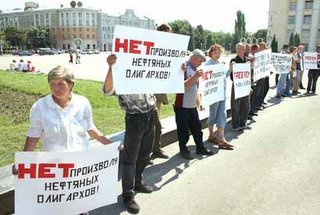 Moscow, TNK-BP office 14 September 2005
Moscow, TNK-BP office 14 September 2005
Appendix III. Inquiry of a citizen
From Shingarkin M.A, Director
30 June 2005
(identical letters written to)
Federal service on supervision in sphere of the rights of consumers and well-being of the person
103055, Moscow, Vadkovskyi per., 18/20
Center of the State sanitary-and-epidemiologic supervision of Ryazan Region
Ryazan, ul. Ostrovskogo, b. 51а
Federal Wildlife Supervision Service
123995, Moscow, ul. B. Gruzinskaya, b. 4/6,
Central Department of Federal Service of the Wildlife Supervision in Ryazan Region 390044, Ryazan region, Ryazan, Moscow shosse, b. 12
Federal Service on Environmental, Technological and Nuclear Supervision
109147,Moscow, ul. Taganskaya, b. 34, corp. 1
Central Department of Federal Service on Environmental, Technological and Nuclear Supervision
INQUIRY of the CITIZEN
(according to Clauses 33, 42 of the Constitution of Russia, Clause 8 of the Federal Law «On sanitary-and-epidemiologic well-being of the population»)
I address to you with the request to undertake urgent measures in connection with the facts of environmental contamination in city of Ryazan.
At territory of the Ryazan Refinery (RNPK) owned by TNK-BP corporation, part of “Alpha-Group” Connsortium, from under the apperture in the fence of enterprise starts a stream to the width up to 2 meters, depth up to 1 meter and extent about 100 meters of water polluted by mineral oil. Stream origins in the territory of TNK-BP refinery, where in it longs for 400 metres. Dumps of mineral oil occur directly on open ground. I assume, that, being filtered through a ground, mineral oil penetrates in the Listvjanka river, and from it – right into the Oka river.
However under the statement of representatives of the company the source of the given pollution is outside of the territory of RNPK.
Other fact of environmental contamination is dump of mineral oil into the natural reservoir which was earlier settled down outside the territory of RNPK and then was captured by the enterprise and attached to protected territory of RNPK. I assume, that the given reservoir can be connected with the small river Listvjanka or subsoil waters, that in turn assumes hit of mineral oil into a river system of the Oka.
The administration has recognized that in the given reservoir the drains of the storm industrial water containing mineral oil are being dumped.
The inhabitants who have informed on pollution, believe, that the given infringements occur already for some years.
Pollution of ground, water objects by mineral oil directly is forbidden by operating Russian legislation: clauses 13, 42 of the Ground Codes of the Russian Federation, clauses 98, 104, 106 of the Water Codes of the Russian Federation, clauses 3, 46 of the Federal law “On protection of the environment”.
I consider, that the facts of environmental contamination mentioned above infringe the right of citizens to the favorable environment, guaranteed by clause 42 of the Constitution of the Russian Federation, clauses 3, 11 of the Federal laws “On protection of the environment”. Dumps of mineral oil can make also a threat for health of inhabitants of the Ryazan region as the polluted waters can get in sources of potable water of the settlements located below on the Oka river.
In correspondence with a clause 11 of the Federal law “On protection of the environment”, citizens have the right to address in bodies of the government of the Russian Federation, bodies of the government of subjects of the Russian Federation, institutions of local government and other organizations with complaints, applications and offers concerning protection of the environment, negative influence on an environment, and to receive the duly and proved answers.
The Ryazan oil Refining Company (RNPK) is one of the largest enterprises of the Ryazan region and a source of the high danger. Inhabitants of Ryazan are extremely concerned by the fact of environmental contamination by mineral oil, therefore I address in bodies of the government, authorized to carry out the control and supervision of observance of the nature protection legislation, and I ask you:
- To lead sanitary-and-epidemiologic investigation of the facts specified in circulation with the purpose of revealing of sources of dumps by mineral oil, and also responsible entities and persons.
- To make sampling and necessary analyses of ground, water and air for definition of concentration of mineral oil with a view of an establishment of conformity to sanitary rules.
- To inspect the specified facts with the purpose of finding-out influence of the given dumps on quality of potable water of settlements.
- To undertake corresponding measures to the elimination of environmental contamination by mineral oil.
On results of checks and the measures undertaken on the basis of our reference in conformity with clause 52 of the Federal law “On sanitary-and-epidemiologic well-being of the population” I ask to inform in writing to the address of: 117449, Moscow, street Bolshaya Cheremushkinskaya, b. 2, corp. 3, fl. 63.
Director
Shingarkin M.A.
Resp. Ivanova Y.A. tel. (095) 1235811
And also 30 June 2005 letter
To the Public Prosecution Office of Ryazan Region
390023, Ryazan, ul. Vvedenskaya, b. 81
Complaint
(according to the Federal Law “On Public Prosecution Office of the Russian Federation”)
I address to you with the request to undertake urgent measures in connection with the facts of environmental contamination in city of Ryazan.
At territory of the Ryazan Refinery (RNPK) owned by TNK-BP corporation, part of “Alpha-Group” Connsortium, from under the aperture in the fence of enterprise starts a stream to the width up to 2 meters, depth up to 1 meter and extent about 100 meters of water polluted by mineral oil. Stream origins in the territory of TNK-BP refinery, where in it longs for 400 metres. Dumps of mineral oil occur directly on open ground. I assume, that, being filtered through a ground, mineral oil penetrates in the Listvjanka river, and from it – right into the Oka river.
However under the statement of representatives of the company the source of the given pollution is outside of the territory of RNPK.
Other fact of environmental contamination is dump of mineral oil into the natural reservoir which was earlier settled down outside the territory of RNPK and then was captured by the enterprise and attached to protected territory of RNPK. I assume, that the given reservoir can be connected with the small river Listvjanka or subsoil waters, that in turn assumes hit of mineral oil into a river system of the Oka.
The administration has recognized that in the given reservoir the drains of the storm industrial water containing mineral oil are being dumped.
The inhabitants who have informed on pollution, believe, that the given infringements occur already for some years.
Pollution of ground, water objects by mineral oil directly is forbidden by operating Russian legislation: clauses 13, 42 of the Ground Codes of the Russian Federation, clauses 98, 104, 106 of the Water Codes of the Russian Federation, clauses 3, 46 of the Federal law “On protection of the environment”.
Clauses 250, 254 of the Criminal Codes of the Russian Federation provide the criminal liability for pollution of waters and damage of the ground.
I consider, that the facts of environmental contamination mentioned above infringe the right of citizens to the favorable environment, guaranteed by clause 42 of the Constitution of the Russian Federation, clauses 3, 11 of the Federal laws “On protection of the environment”. Dumps of mineral oil can make also a threat for health of inhabitants of the Ryazan region as the polluted waters can get in sources of potable water of the settlements located below on the Oka river.
In correspondence with a clause 11 of the Federal law “On protection of the environment”, citizens have the right to address in bodies of the government of the Russian Federation, bodies of the government of subjects of the Russian Federation, institutions of local government and other organizations with complaints, applications and offers concerning protection of the environment, negative influence on an environment, and to receive the duly and proved answers.
The Ryazan oil Refining Company (RNPK) is one of the largest enterprises of the Ryazan region and a source of the high danger. Inhabitants of Ryazan are extremely concerned by the fact of environmental contamination by mineral oil.
Therefore I ask to undertake measures of public prosecutor’s reaction according to the Federal law “On Public Prosecutor Office of the Russian Federation” for the elimination of environmental pollution by mineral oil. On the measures accepted on the basis of the inquiry I ask to inform in writing to the address of: 117449, Moscow, street Bolshaya Cheremushkinskaya, b. 2, corp. 3, fl. 63.
Director
Shingarkin M.A.
Resp. Ivanova Y.A. tel. (095) 1235811
Appendix IV. V. Oleniev Letter to G. Galloway, MP
(26 August 2005)
For George Galloway
HOUSE OF COMMONS
LONDON, SW1A 0AA
Dear Colleague!
The Government of the United Kingdom is the biggest shareholder of the BP company. This corporation together with the Russian Consortium “Alpha-group” created the joint company TNK-BP extracting and processing oil in territory of the Russian Federation. One of the enterprises of the multinational corporation is the Ryazan Refinery (RNPK – Ryazansky Neftepererabatyvayushiy Zavod) which is shared for 100 %.
Being the Member of the Ryazan Regional Duma, I receive letters of citizens where there are pointed out dumps of water polluted with mineral oil on open ground caused by the activities of RNPK. The width of dump makes 2 meters, depth about 1 meter and extent about 100 meters.
Other fact of environmental contamination is dump of mineral oil in a natural reservoir directly in territory of the RNPK. A prospective source of pollution of this natural reservoir is superfluous waters of the storm industrial water drain. The given pollution occurs for a few years.
Pollution of ground, water objects with mineral oil is forbidden by the current Russian legislation: clauses 11, 21, 22 of Federal laws “On sanitary-and-epidemiologic well-being of the population”, clauses 13, 42 of the Ground Codes of the Russian Federation, clauses 98, 104 of the Water Codes of the Russian Federation, clauses 3, 46 of Federal laws “On protection of the environment”.
Citizens consider, that the facts of pollution mentioned above infringe their right to the favorable environment, guaranteed by clause 42 of the Constitution of the Russian Federation, clauses 3, 11 of Federal laws “On protection of the environment”. Dumps of mineral oil can represent also a threat for health of inhabitants of the Ryazan Region as the polluted waters can penetrate in sources of potable water of the settlements located below on a watercourse of the Oka river.
In connection with that international company British Petroleum is under jurisdiction of the United Kingdom, I ask you to address to a company management with the requirement to take utmost urgent measures to for elimination of environmental pollution at the RNPK.
Member of the Ryazan Regional Duma
V.V. Oleniev
APPENDIX V. George Galloway Letter To Lord John Browne

HOUSE OF COMMONS LONDON SW1A 0AA
John Browne
BP Group Chief Executive
International Headquarters 1 St James’ Square London, SW1Y4PD
28th July 2005
Dear John Browne,
BP environmental pollution in Russia
I am writing to you as a representative of the Board of Directors of BP, whose responsibilities include supervision of BP’s observance of environmental protection and social legislation in countries where you have established a presence. My letter is based on information I have received from Russian organizations mentioned below.
Experts in the field of environmental legislation from the International Social-Ecology Union, Citizen Foundation together with a group of environmental monitors from the Institute for Globalization Studies, during scheduled spot checks earlier this year across the territory of Russia, identified a number of large-scale infringements of environmental protection legislation of the Russian Federation caused by the economic activities of BP. These included unauthorized oil emissions and accompanying mineral oil in the following regions:
- Ryazan region, Central Federal District of Russia – on June, 27th, 2005 near the territory of the Ryazan oil refinery there were fixed dumps of water polluted by mineral oil on open ground; the polluted water came from an illegally established drainage platform;
- Orenburg region, Ural Federal District of Russia – on April, 24th, 2005 near the pipeline NGDU “Buzuluk Oil” (a BP pipeline) at the village of Zhilinka there was an emission of oil in the form of a fountain to the height of 50 meters and total volume of 400 tons of mineral oil;
- Samotlor oil-and-gas deposit, Western Siberia — in January, 2005, based on an analysis of data from the satellite LANDSAT-7, there appeared to be oil covering an area of 3780 sq km. According to the data analysis, the surface covered by oil exceeded 11,000 hectares, and more than 10% of the polluted territory was covered with the fresh emissions of oil deposited over the preceding 2-3 years. On tentative estimations the quantity of oil per hectare was between 100 and 400 tons.
The Russian BP office has not presented any public information concerning these cases and has ignored inquiries from the above-mentioned organizations. BP has also failed to undertake any measures to address these infringements of environmental law.
I am therefore asking you to investigate with the utmost urgency these alleged infringements by BP in the specified regions and to arrange the elimination of this pollution.
In addition I think it would be a very good idea if you were to present publicly a report in September on how much you have spent from January to August 2005 inclusive on ecology, recultivation and rehabilitation and social responsibility in Russia and to inform the general public of the United Kingdom and the Russian Federation on the measures undertaken by the company on restoration of the polluted regions.
I believe that prompt action will provide BP with a chance to show that the principles you espouse of openness, honesty and social responsibility are more than mere words.
Yours sincerely,
George Galloway MP
Appendix VI. BP Letter To George Galloway
(11 August 2005)
(Click on the image to bring up a full-size, more readable page)
Appendix VII. Guy Taylor Interview
Guy Taylor is a quiet spoken, very likable person. He is totally dedicated to his anti-war, anti-corporate vision. He was born in Kent in 1966. He never studied at University. “I screwed up my A Levels,” he said. He then attended Brighton College of Technology, dropping out of the software engineering course when he was elected President of the Student Union. He set up Globalise Resistance, which has attracted a very large following. He is presently involved with the Climate March in London on 3 December. Then he will go to Hong Kong for the WTO protests, traveling via South Korea to join up with peasant activists from Korea.
When did the idea of setting up Globalise Resistance occur to you?
“The idea came after the IMF/World Bank demonstration in Prague in 2000. There had been 2 separate mobilisations: the hard left (socialist and anarchist) and the NGO’s – especially Jubilee 2000 / Drop the Debt.
The original idea of Globalise Resistance was to create a broad and inclusive mobilisation for Genoa in July 2001. We set up a conference which would tour the country with speakers from the left, NGOs, commentators (George Monbiot, John Pilger, etc), unions and others. The state was found to be involved in canceling our venues – twice in London Imperial College and Goldsmiths, once in Manchester. When Monbiot mentioned this in the Guardian, and printed my mobile number at the end of the article, the bookings went through the roof. We had over 1500 people at the London event and almost 5000 in total around the country.
Soon afterwards we organised a meeting at Conway Hall in central London entitled “Preparing for Genoa” with no big name speakers. It was to be an organising meeting and we expected about 30 -40 people to come. On the night 250 showed up, the police were outside filming and the place was buzzing. It was at that point where it was obvious the thing was more than a mobilisation to just the one protest. Instead of the 4 planned working groups set up that night – we planned fundraising, mobilising, networking and transport / logistics – we had 10 working on things like MayDay, women and globalisation, climate change and such like. Soon afterward, I packed in my photography course at the local college and rented a small office in Mile End. We set up an open steering committee, but that was regularly getting 70 – 100 at each meeting. It was too unwieldy and things moved very slowly, so we set up an activists conference and elected a smaller committee there with about 20 people or so from all different parts of the movement.”
What is the main focus of Globalise Resistance?
“This varies as the situation progresses. After Genoa, we were set on an anti-corporate course. GAP had been hit on international women’s day. We held a small but significant campaign against the pharmaceutical companies. Then 9/11 happened. We were one of the first groups to help forge the Stop the War Coalition – one of our proudest achievements. It became the biggest social movement ever known in UK history.
We have a history of lots of smaller things: against pharmaceutical corporations, the Get Kissinger campaign, international solidarity actions, helping to organise and build the European Social Forum and the World Social Forum – that kind of thing.
Now we’re turning the spotlight on environmental campaigns – especially on TNK-BP in Siberia and the damage they are doing there, and on Climate Change. We’re very much a part of the Campaign Against Climate Change and want to make this a central issue for protesters and public alike.”
For how long has Globalise Resistance been ‘on line?’
“Since very soon after we started. In fact, I started sending out weekly emails to people who had signed up for the original London conference as we booked more speakers, arranged more workshops and changed the venues after they’d been cancelled! Those mails mutated into the emails that our members and supporters are still subjected to now!”
How has Globalise Resistance developed over the years?
“We’ve made things up as we go along. We can’t set agendas ourselves; the political situation we are in does that. We’ve had to be adaptable, I think it’s been in four overlapping and indistinct phases:
- Genoa, more anti-corporate activity, lots of small mobilisations and about 5 – 10 projects going at any one time.
- Post 9/11, focused on building a huge anti war movement in the UK.
- Lots of international mobilisations – against the EU, the IFIs and such like. Within these mobilisations we tried (and largely succeeded) to export the antiwar movement ideas across Europe and further afield.
- The Social Forums. Florence in 2002 was an amazing experience and Paris and London in the proceeding years were both good boosts to the movement. They took a lot of time and resources to prepare.
I think we’re returning to a time more like number 1 above, but with elements of 2 – 4 included. It is hard to predict… “
Could you tell me some of the Globalise Resistance highlights for you?
“Personally it would be hard to beat getting 1500 people to Genoa, an historic protest. Others include: Kissinger has not been back to the UK (as far as we know) since we protested at his last appearance for the Institute of Directors back in April 2002. I enjoyed the Seville anti-EU mobilisation enormously – met some fantastic people, experienced a national general strike for the first time. The Florence ESF was unforgettable. A small delegation of us went to New York for the WEF protest in Feb 2002 and marched through Manhattan months after 9/11 with an antiwar banner.”
Is there anything else you would like to say?
“The anti-capitalist movement, or global justice movement, is an inspiration. Never before have we had such a vibrant and massive movement. Just a glance at Latin America shows what is possible (and what is at stake). There have been arguments and splits but that is natural. What matters is that the defensiveness of some corporations and the sensitivity of the state are obvious. Labour is trying to clampdown on every form of dissent for a reason. Corporations like BP portray themselves as environmentally friendly because they’re scared what might happen to them.
I don’t believe in people getting ‘burned out’ by working too hard. We all need a break or a holiday every now and then, but there’s so much at stake we have to push it harder all the time.
When we are looking at changing the world, we have to take into account where mass consciousness lies, what is achievable in the immediate and short term future and where best we can put our efforts. It is not about protest heroics; it is about encouraging, convincing and inspiring the mass of people. I hope we are contributing towards that.”
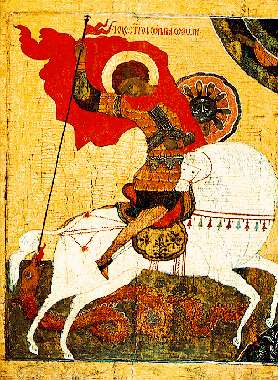
St. George and the Dragon, Novgorod XVc
Information on the NGO environmental struggle in Russia will be periodically updated.
Sarah Meyer is a researcher living in Sussex, England. See her blog, http://indexresearch.blogspot.com.
Her email address is: [email protected]


